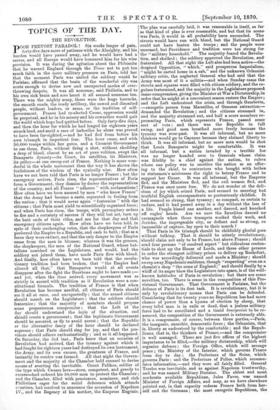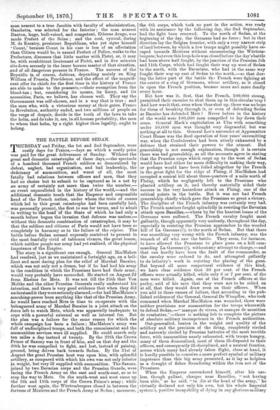TOPICS OF THE DAY.
■ 4111,■.
THE REVOLUTION.
POOR PREVOST PARADOL I Six weeks longer of pain, forty-five days more of patience with the Almighty, and his burden would have passed away, and he would have had a career, and all Europe would have honoured him for his wise prevision. It was during the agitation about the Plebiscite that he warned England through the Times not to put too much faith in the mere military pressure on Paris, told her that the moment Paris was united the soldiery would be Parisian, affirmed that the brain of the wonderful city was acute enough to devise new and unexpected modes of over- throwing despots. It was all nonsense, said Philistia, and to his own sick brain and sore heart it all seemed nonsense too. There was the mighty army, there were the huge barracks, the smooth roads, the ready artillery, the cowed and disunited people, without leaders, or arms, or the tradition of self- government. France had re-elected Caesar, oppression would be perpetual, and he in his misery and his cowardice would quit the world which hope had quitted before. Only forty-five days, and then the hour for which he had longed for eighteen years struck loud, and amid a race of imbeciles he alone was proved to have been far-sighted,—and he had fled from before his own triumph in impatient fear. The hour came, and with 50,000 troops within her gates, and a Cmsarist Government to use them, Paris, without firing a shot, without shedding a drop of blood, almost by an act of pure volition, swept the Bonaparte dynasty—its Court, its satellites, its Ministers, its policy—at one sweep out of France. Nothing is more won- derful in the whole movement than the way it has shown the foolishness of the wisdom of the cynically wise. How often have we not been told that Paris is no longer France ; but the emergency arrives, Paris rises, the representatives of Paris form a Government, they dismiss by decree the representatives of the country, and all France " adheres " with acclamations ! How often have we been assured by men " who know France" that the Army had become a caste, separated in feeling from the nation ; that it would never again " fraternize " with the citizens ; that Paris must yield to scientifically organized force; and when Paris has risen, the troops, with peremptory orders to fire and a certainty of success if they will but act, turn up the batt ends of their rifles, and are for that day and that emergency citizens again. How often have we been told, in spite of their unchanging votes, that the shopkeepers of Paris preferred the Empire to a Republic, and cash to both ; that as a force they were extinct, and that the only danger to the Empire came from the men in blouses; whereas it was the grocers, the shopkeepers, the men of the National Guard, whose bat- talions marched on the Legislature, and would, had the soldiery not joined them, have made Paris flow with blood. And finally, how often have we been told that the revolu- tionary tradition had been broken, that " the Empire had altered all that," that Bonapartes would at all events disappear after the fight the Bourbons ought to have made ;- and yet, when the time arrived, every movement was as strictly in accord with tradition as if Revolution were a con- stitutional formula. The tradition of France is that when Revolution has become needful, all citizens of Paris should see it all at once, and unexpectedly ; that the armed citizens should march on the Legislature ; that the soldiers should fraternize ; that the majority of members should propose some preposterous compromise ; that the Left of the day should understand the logic of the situation, and should create a government; that the legitimate Government should be arrested, or fly to avoid arrest ; that the Republic or the alternative fancy of the hour should be declared supreme; Paris should sing for joy, and that the pro- vinces sould adhere enthusiastically ; and so it all happened. On Saturday, the 3rd inst., Paris knew that an occasion of Revolution had arrived, that the tyranny against which it had fought for eighteen years had destroyed its own instrument, the Army, and its own excuse, the greatness of France, and instantly its resolve was formed. All that night the Govern- ment and the majority of the Chamber held counsel to devise means of averting the inevitable. Count Palikao, soldier of the type which Caesars love—stern, competent, and greedy to excess—had ordered his 50,000 men to protect the Chamber ; and the Chamber, filled with pensioners, nominees, and rich Philistines eager for the social deference which attends courtiers, had resolved to announce the accession of Napoleon IV., and the Regency of his mother, the Empress Eugenie.
The plan was carefully laid, it was reasonable in itself, as far as that kind of plan is ever reasonable, and but that its scene was Paris, it would in all probability have succeeded. The streets would have run with blood, but the National Guard could not have beaten the troops ; and the people were unarmed, but Providence and tradition were too strong for the "military household." The majority feared the Revolu- tion, and skulked ; the soldiery approved the Revolution, and` fraternized. All that night the Left also had been active—the- despised Opposition, " which," said prosperous Imperialism, "might be carted home in a cab," and the unknown Orleanist military critic, the neglected General who had said that the- Army was most of it a militia—and when Sunday came the streets and squares were filled sith citizen soldiery, and the re- gulars fraternized, and the majority in the Legislature proposed inane compromises, giving the Minister at War a Dictatorship, in order that he might at a convenient season restore the Empire ; and the Left understood the crisis, and through Gambetta, —energetic person from Marseilles, of Genoese extraction— demanded the Revolution ; and the citizens streamed and the majority streamed out, and half a score members re- presenting Paris, which represents France, passed some sort of vote ; and there was the Republic in full swing, and good men breathed more freely because the tyranny was over-past. It was all informal, but no more thinkers would go to Cayenne because they claimed liberty to think. It was all informal, but no more men would be shot that Louis Bonaparte might be comfortable. It was all informal, but a nation invaded by a terrible foe was no longer handed over to Generals whose claim was fidelity to a chief against the nation, to rulers whose one policy was to sacrifice the nation as an offer- ing to the chief, to contractors who bought with bribes. to statesmen's mistresses the right to betray France and to support her Caesar. It was all informal, but the Empress fled, and the Ministers fled, and the evil women fled, and France was once more free. We do not wonder at the deli- rium of joy which seized Paris, and seemed to sneering but truthful English correspondents so portentously childish. It had seemed so strong, that tyranny; so compact, so certain to endure, and it had passed away in a day without the loss of a life. People kissed one another, and danced, and knocked off eagles' heads. Are we sure the Israelites danced no carmagnole when those trumpets worked their work, and Jericho, the impregnable city, so defiant and so strong, so. impossible of capture, lay open to their march ?
That Paris in its triumph should be childishly gleeful goes. without talking. That it should be utterly revolutionary„ should claim not only to be France, but above France ; should send four persons "of resolved aspect" but ridiculous creden- tials to shut up the House of Lords, and three other persons. to order the strongest military prison to deliver up Rochefort,. who was accordingly delivered and made a Minister ; should sweep away Napoleonic emblems, though "respecting" even on a chemist's shop "the arms of England;" and should finally by a whiff of its anger blow the Legislature into space, is of the well- known habitudes of Paris in revolution ; but there are some novelties, too. There is sense in the composition of this Pro- visional Government. That Government is Parisian, but the defence of Paris is its first task. It is revolutionary, but it is only by revolutionary means that Paris can be defended. Considering that for twenty years no Republican has had more chance of power than a hyaena of election by sheep, that every tried man is in exile or dead, that a jealous military force had to be conciliated and a timid bourgeoisie to be re- assured, the composition of the Government is extremely able. It is a compromise, of course, between three parties,—Paris, the inorganic, anarchic, democratic force ; the Orleanists, that is, liberty as understood by the comfortable ; and the Repub- licans, that is, the thinkers of France,—and the compromise is well managed. There are just five offices of the highest importance to be filled,—the military dictatorship, which will organize defence ; the Foreign Office, which will arrange peace ; the Ministry of the Interior, which governs France from day to day ; the Prefecture of the Seine, which governs Paris ; and the Prefecture of Police, which accumu- lates information,—and they were all fairly filled. General Trochu was inevitable, and as against Napoleon trustworthy, and he was named Military Dictator. The ablest and most moderate available Republican, Jules Fevre, was named Minister of Foreign Affairs, and may, as we have elsewhere pointed out, in that capacity redeem France both from her- self and the Germans ; the most energetic Republican, the
man nearest to a true Jacobin with faculty of administration, Gambetta, was selected for the Interior ; the man nearest Denton, huge, bull-voiced, and competent, Etienne Arago, was made Prefect of the Seine ; and the cool, cynical, daring M. de Keratry, persistent Republican, who yet signs himself Count,' because Count in his case is less of an affectation than Citizen would be, is named Prefect of Police, walks to the Prefecture, discusses that little matter with Pietri, or, it may be, with recalcitrant lieutenant of Pietri, and in five minutes sits down serenely in the inner bureau master of that situation, and of all dangerous persons in France. The success of the Republic is, of course, dubious, depending mainly on King William of Prussia, Providence, and the effect of the magnifi- cent offer its chiefs for the first time in the history of France are able to make to the peasants,—their exemption from the blood-tax ; but, considering its means, its hurry, and its necessities, Paris, we believe, has chosen well. They say the Government was self-chosen, and in a way that is true ; and the men who, with a victorious enemy at their gates, France in Revolution, authority ended, and two millions of people on the verge of despair, decide in the teeth of the laws to take the helm, and do take it, are, in all human probability, the men to whom that helm, by a right higher than legality, ought to belong.































 Previous page
Previous page